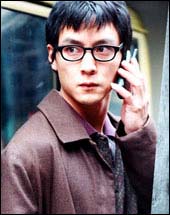One Nite in Mongkok (2004, Dir. Derek Yee)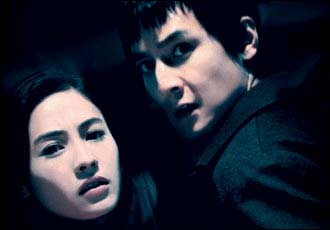
Time marches on; some things change, some stay the same. Cliches all, but in the case of mainstream Hong Kong cinema, undeniably true. In its halcyon days of the 80s and 90s, the territory's film industry injected a dazzling kineticism into its genre projects, rediscovering the poetry of pulp first forged by Hollywood during its own golden era half a century before, even while concocting its own bastard takes on the subject matter: half affectionate parody, half loving sincerity. Since then, the world has turned, and other countries (Tinseltown not the least among them) have appropriated and regurgitated these earmarks
ad nauseum. Tarantino and his ilk applied HK's flippancy to matters of character, plot and time, even while
Wong Kar-Wai did the same to further his own dazzlingly self-absorbed visions. Hollywood hacks gleefully jacked up the two-fisted gun action, the sights of bodies soaring and defying easy physics, while younger, less jaded nations like Thailand have cribbed the bone-crunching acrobatics and chivalric backbone of countless martial arts and gangster classics (
Ong Bak being the most exhilarating example). If that weren't enough, the 1997 China takeover and an economic crisis have knocked the ebulliance out of Hong Kong's sails. Nowadays, the former crown colony and future Chinese possession is adrift, mining played-out commercial formulas (as is the case with most of its genre output these days), or retreating down artistic paths that look more and more like cul-de-sacs (see Wong Kar-Wai's
2046, ravishing but ultimately "more of the same"). Any film that attempts to do something different (like the overrated
Infernal Affairs series) looks like a relative godsend compared to these second-rate knockoffs and recapitulations.
So welcome
One Nite in Mongkok, winner of two awards at the 2004 Hong Kong Film Awards (best director and screenplay), and the latest prestige HK project plagued with the curse of expectations. The
San Francisco Asian Film Festival blurb for this film is redolent with mentions of slimy cops and criminals, lovers on the run, sweaty and intense circumstances, plenty of the stuff that leads us to cast fond remembrances back on Hong Kong heydays. So yes, sign us up. And sure enough, the first 15 minutes of the film, resembling a tamer
Takashi Miike outing, is a whirligig of escalating events. It opens cheekily with a cryptic exchange of dialogue about fate between two grizzled policemen, Milo (Alex Fung, wired yet exhausted) and his sidekick Brandon (a jaunty Chin Kar-Lok) that cuts abruptly to an intertitle and flashback: "The Day Before Yesterday." So much for just one night in Mongkok. Instead, we meet a motley crew of street hustlers and prostitutes, a petty argument over the price of knockoff watches leading to gang warfare, an off-handedly brutal car accident that claims the life of a triad godfather's son, and a revenge reprisal that blooms into a plot to kill the rival boss, carried out by bespectacled Lai Fu (Daniel Wu), a capable yet unworldly China country boy imported by Brother Six (Lam Suet), a former resident in Lai's village who has become all too comfortable with pawning bootlegged cell phones, hiring hitmen who get thrown in prison, and wearing loud Hawaiian shirts. It's up to Milo and his crack police squad (including the requisite enthusiastic but trigger-happy rookie) to stop the bloodbath before it occurs, on Christmas Eve no less, in Mongkok, the most populous neighborhood in the world (as we are reminded in none-too-subtle fashion at the conclusion of the film).
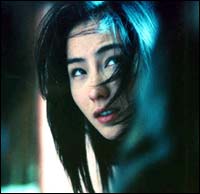 |
With that race-against-time plot set in place, we are then introduced to the wild card who will make mincemeat of that standard genre setup: buoyant Dan Dan (Cecilia Cheung), the prostitute Lai rescues from the clutches of a violent john soon after his arrival in Hong Kong. A fellow mainlander with dreams of making it big and going back to the home country in style, she could qualify as your standard hooker with the heart of gold, if it weren't for the loving glances she gives the wads of bills that Lai carries about as advance payment for his hit job. Yet, as the movie progresses, and these two would-be-but-not-quite lovers wander through the bewildering density and signage of downtown Kowloon, Lai's original assignment is sidetracked and ultimately circumvented by his growing need to protect Dan Dan, as well as his search for a long-lost love from his old hometown (could it be the prostitute who was involved in the car accident at film's beginning? No points for guessing correctly). Meanwhile, even as his dragnet draws ever closer to Lai, Milo himself is forced to compromise his integrity as a shakedown goes disastrously awry in a way that Vic Mackey from the TV show "The Shield" can relate to.
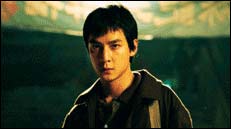 |
Despite the caffeinated high of its first 15 minutes,
One Nite in Mongkok is bereft of the thrills one would expect from a genre piece -- apart from a well-directed chase or two, the story prefers to stay at a low boil. The pleasures here come from the acting, and Yee's bustling visualization of Mongkok as urban playpen of the scuzzy and lowly. Encapsulating the film's theme, Dan Dan remarks at one point, "How can they call this place Hong Kong ["fragrant harbor"] when it stinks so much?" It will be a line re-echoed by film's end, but with even less levity. As they are swallowed by the multivarious alleys, ramshackle apartments, and trashy dead-ends of Mongkok, our mainland heroes are ultimately chewed up and spit out by the callousness of Hong Kong life, as they fall prey to the materialism that is part and parcel of this fragrant society (Lai Fu is forced to ditch his glasses for contact lens, Dan Dan goes starry-eyed over gold jewelry and other gifts for her mainland relatives even as she mispronounces "panadol"). The Hong Kong characters, on the other hand, are either irredeemable thugs, or honest men like Milo forced to bend their morals for some hazy notion of a greater good. All in all, the screenplay is painted prosaically, but the actors keep the characters humming. Wu (in marked contrast to his strutting supporting role in
New Police Story) expertly underplays his character, and despite being dubbed, Cheung grafts some surprising shades onto Dan Dan. Among the supporting players, Lam Suet's Brother Six is an amusing scuzzball who ultimately proves heartbreaking -- his final scene contains a hard kernel of emotion that the rest of the film doesn't quite match -- while Fong brings gravitas to his role of harried police officer.
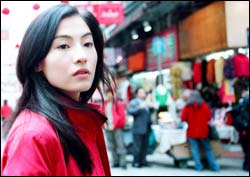 |
Unfortunately, the film falls victim to an aimlessness that can be deadly for a story of this ilk. In the end, its glum indictment of Hong Kong, and its representation of the cross-culture despair between mainlanders and Hong Kongers all but overwhelms the putative plot. Coincidences happen, some fortuitous, some calamitous, but instead of tightening up, threads intersecting and interweaving in ever more-gripping and surprising permutations, the story runs out of steam, culminating in a pitiless conclusion that feels more like a math theorem for tragedy rather than something organic, messy, and real. Stranded in the no-man's-land between true drama (none of the characters or situations, as written, can qualify as truly original) and the visceral impact of potboilers from days of Hong Kong yore, it's best to think of this film as a report from the current front lines of Hong Kong cinema: caught in the movement between past and future, much like Lai and Dan Dan, sidetracked from the usual fates, not fully formed but fascinating in its mournful, ghost-like wanderings through story and time.

